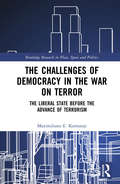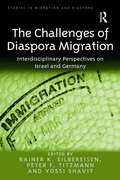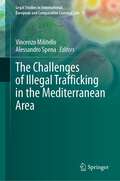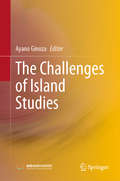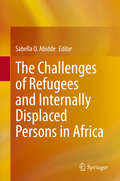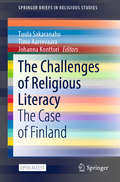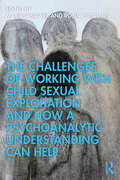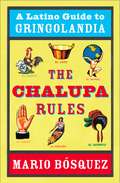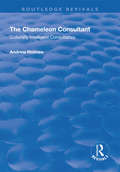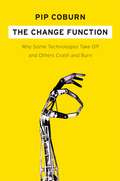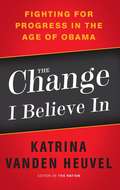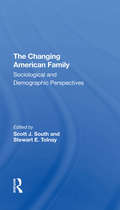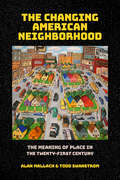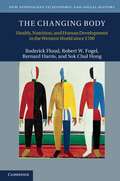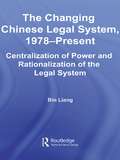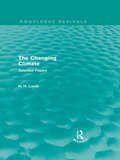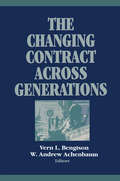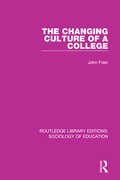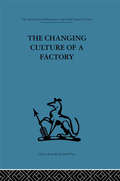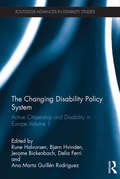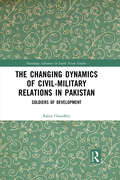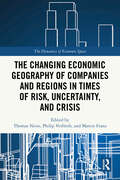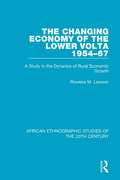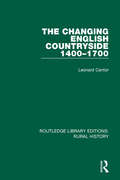- Table View
- List View
The Challenges of Democracy in the War on Terror: The Liberal State before the Advance of Terrorism (Routledge Research in Place, Space and Politics)
by Maximiliano E. KorstanjeThis book unravels the role of democracy after the 9/11 terrorist attacks and reflects important debates surrounding the security of Muslim communities in the years to come. It looks at the problems of torture, violence and the legal resources available to contemporary democracies to confront terrorism. While terrorism is often regarded as one of the major threats to the West and the nation-state, this book explores the notion that a disciplined sense of terror is what keeps society working. The strengths and limitations of liberalism are examined, as well as the ethical dilemma of torture and human right violations in the struggle against terrorism. This book carefully dissects the origin of the nation-state and how it keeps society united. The author offers a creative and unique approach to democracy and worldwide terrorism, exploring the consequences for the nation-state. This book looks at the connections between terrorism, mobility, consumption, torture and fear. It will be of interest to researchers as well as postgraduate and postdoctoral students within the fields of Human Geography, Politics, Media and International Relations.
The Challenges of Diaspora Migration: Interdisciplinary Perspectives on Israel and Germany (Studies in Migration and Diaspora)
by Rainer K. Silbereisen Peter F. TitzmannDiaspora or 'ethnic return' migrants have often been privileged in terms of citizenship and material support when they seek to return to their ancestral land, yet for many, after long periods of absence - sometimes extending to generations - acculturation to their new environment is as complex as that experienced by other immigrant groups. Indeed, the mismatch between the idealized hopes of the returning migrants and the high expectations for social integration by the new host country results in particular difficulties of adaptation for this group of immigrants, often with high societal costs. This interdisciplinary, comparative volume examines migration from German and Jewish Diasporas to Germany and Israel, examining the roles of origin, ethnicity, and destination in the acculturation and adaptation of immigrants. The book presents results from various projects within a large research consortium that compared the adaptation of Diaspora immigrants with that of other immigrant groups and natives in Israel and Germany. With close attention to specific issues relating to Diaspora immigration, including language acquisition, acculturation strategies, violence and 'breaches with the past', educational and occupational opportunities, life course transitions and preparation for moving between countries, The Challenges of Diaspora Migration will appeal to scholars across the social sciences with interests in migration and ethnicity, Diaspora and return migration.
The Challenges of Illegal Trafficking in the Mediterranean Area (Legal Studies in International, European and Comparative Criminal Law #9)
by Vincenzo Militello Alessandro SpenaThe book deals with illicit trafficking in the Mediterranean, seen as a borderline issue between mobility and security under a strongly interdisciplinary approach. The opening part is dedicated to issues that transversally concern illegal trafficking: criminological, criminal law, criminal procedure, but also international law issues. This part presents a kind of general theory of illegal trafficking, showing its recurring aspects and identifying the legal and criminal-political issues that would be best addressed by a unified approach to the matter. The other parts are devoted to presenting, instead, a special part overview of illegal trafficking. The second and the third section are devoted, in particular, to illegal traffics having human beings as their objects. More specifically, the second part examines smuggling of migrants, which has a central - criminological and criminal-political - relevance among the illegal traffics taking place in the Mediterranean. The third part deals with the neighbouring theme of human trafficking, especially in its connection with the problem of labour exploitation. Finally, the fourth part focuses on some trafficking in goods, offering a selected and representative overview of some of the most significant forms that such trafficking can take: tobacco trafficking, drug trafficking and trafficking in cultural goods.
The Challenges of Island Studies
by Ayano GinozaThis book places islanders’ struggles and knowledge at the forefront of island studies. Written by experts from diverse fields and locations, it covers a wide range of topics, from the history of island studies to critical ocean studies. In remapping the field of island studies from Okinawa, an emerging hub of community-based knowledge and interdisciplinary collaboration between leading critics and theorists in geography, linguistics, tourism, literature, international relations, and peace studies reveals the challenges for the future of island studies. The book consists of two parts: the first offers a collection of individual contributions that demonstrate the vital role that the field’s interdisciplinarity can play in creating bridges between the political and social issues islanders and the islands face and the disciplines involved. The second part provides a cross-disciplinary discussion between the authors and scholars of island studies in Okinawa, including local experts, and suggests new ways to think about the future of island studies that are intricately linked to islanders’ agency, preservation of languages and heritage, and the security of the islands. As such, the book directly addresses the current state of the field as well as with its future.
The Challenges of Refugees and Internally Displaced Persons in Africa
by Sabella O. AbiddeThis book discusses the phenomena of refugees and internally displaced persons (IDP) across several African countries. There are 40 million IDP worldwide; of these, an estimated 12.6 million are in 37 of Africa’s 55 countries. Written by a team of fifteen scholars across four continents, this book uses both quantitative and qualitative data to analyze the causes and consequences of this displacement, the role of the state in creating and mitigating these situations, and potential policy solutions. The volume is divided into three sections. Chapters in Section 1 discuss the causes of displacement. Chapters in Section 2 discuss refugees in their regional context. Chapters in Section 3 discuss IDP camps in Kenya, Nigeria, and Ghana. Bringing scholarly analysis to address two humanitarian crises, this book will be useful to students and researchers interested in African politics, forced migration, and policy as well as members of the diplomatic corps, governmental, and non-governmental organizations actively working towards solving these challenges.
The Challenges of Religious Literacy: The Case of Finland (SpringerBriefs in Religious Studies)
by Timo Aarrevaara Tuula Sakaranaho Johanna KonttoriThis open access book presents religious literacy as the main explanatory factor when dealing with certain ethnic groups that attract stereotypes which gloss over other personal factors such as age, class, gender and cultural differences. It discusses freedom of religion, and the Christian revival movement. It examines religious literacy and religious diversity in multi-faith schools. It looks into the role of Mosques and Islamic divorce. Finally, it discusses the prevention of violent radicalization and extremism in Finland. Using recent data on Finnish secular society, the book promotes a new understanding which is needed with respect to popular and media portrayal of religion, or with respect to public discussion about religion. It addresses actors in civic society, public servants and higher education.
The Challenges of Working with Child Sexual Exploitation and How a Psychoanalytic Understanding Can Help
by Robin Solomon Marion BowerSexual exploitation is becoming endemic in our society. It involves victims being coerced to enter abusive sexual relationships with individuals or gangs. It can occur with children from care homes – or from more privileged backgrounds. Sexual exploitation is so addictive that it is really difficult to extract the victims. This is the first book that we are aware of that examines exploitation using a psychoanalytic framework which makes the behaviour and motives of victims and, in some cases, exploiters comprehensible. The book looks at a range of situations from care homes to refugee camps and elite schools.We expect this book to become indispensable for social workers, psychotherapists, counsellors, and care workers who have to tackle child sexual exploitation. Giving up an addiction is a struggle. Our clinical examples show how much and what kinds of work are needed to start to release girls from their addiction to their exploiters.The roots of vulnerability lie in an attack on the maternal function. This is reflected in the huge expansion of day-care taking children from as little as three months old. Care for mothers and children can be transformed. We demonstrate how powerful properly organised maternal-type care can be, to give young people a sound start to their lives.
The Challenges of the US-Japan Military Arrangement: Competing Security Transitions in a Changing International Environment
by Anthony DiFilippoThis is an in-depth analysis of the U.S.-Japan security alliance and its implications for Japan and the Asia-Pacific region. It moves away from the official line that the alliance is a vital aspect of Japan's security policy and introduces issues and arguments that are often overlooked: American security policy has failed to achieve its goals; Japan's interests are not fully served by the alliance; the alliance itself is a source of instability in the region; and the arrangement has placed constraints on Japan's own political development. The author measures current developments in U.S. foreign policy against Japan's role in the region and Japan's own political development. He assesses the consequences of the alliance for the current regional situation in Northeast Asia, looks at future policy options for Japan, and makes the case for a neutralist security policy.
The Chalupa Rules: A Latino Guide to Gringolandia
by Mario BosquezThe Host of Martha Stewart's "Living Today" on Martha Stewart Living Radio (Sirius 112/XM 157)brings you this insightful look at how a colorful Mexican game of chance inspired him to succeed in life. "The Chalupa Rules" combines his family's timeless proverbs,traditional Spanish sayings, and powerful imagery to create a blueprint for success. Mario grew up facing tremendous challenges that included poverty and living in a government-sponsored home. With his handcrafted rules-of-life Mario went on to become the first full-time, Mexican-American news anchor in New York City's English television. An award-winning playwright and Emmy-Nominated news anchor/reporter, Mario shares his insights into how your own cultural background can provide the inspiration to reach the American Dream. Part autobiography, part instructional manual, The Chalupa Rules offers readers of diverse cultural backgrounds a universal message of success and fulfillment in the career of your choice. Mario Bosquez, nominated for a James Beard Award for Excellent in Broadcasting, lived the Chalupa Rules and shows us all how we can do the same.
The Chameleon Consultant: Culturally Intelligent Consultancy
by Andrew HolmesThis title was first published in 2002. How do you add value to your clients? Is it the process you use, or the technical skills you deploy? Or perhaps it's your ability to adjust the way you sell and deliver your services based upon your tacit understanding of your client's culture - the way we do things round here. Such chameleon-like behaviour is fundamental to successful consulting, and yet it is neither widely understood nor practised within the profession. Until now. This book describes a powerful way to improve the consultancy process, from selling the service to delivering the engagement, through a concept called cultural intelligence - the missing dimension of effective consultancy. By revisiting the consultancy process using a simple model of organizational culture, this text creates a potent technique for tailoring the principal consultancy processes of selling, relationship management, account management and engagement management. Such tailoring that ensures the consultant and consultancy firm can blend into their clients' organizations more effectively and as a result add immediate and lasting value.
The Change Function
by Pip CoburnThe ultimate guide to predicting winners and losers in high technology Pip Coburn became famous for writing some of the liveliest reports on Wall Street. He quoted everyone from Machiavelli to HAL, Anaïs Nin to Yoda, Einstein to Gandhi. But along with the quirky writing, he consistently delivered sharp insights into technology trends and helped investors pick stocks with long-term potential. After years of studying countless winners and losers, Coburn has come up with a simple idea that explains why some technologies become huge hits (iPods, DVD players, Netflix), but others never reach more than a tiny audience (Segways, video phones, tablet PCs). He says that people are only willing to change when the pain of their current situation outweighs the perceived pain of trying something new. In other words, technology demands a change in habits, and that's the leading cause of failure for countless cool inventions. Too many tech companies believe in "build it and they will come"-- build something better and people will beat a path to your door. But, as Coburn shows, most potential users are afraid of new technologies, and they need a really great reason to change. The Change Function is an irreverent look at how this pattern plays out in countless sectors, from computers to cell phones to digital TV recorders. It will be an invaluable book for people who create and invest in new technologies.
The Change I Believe In: Fighting for Progress in the Age of Obama
by Katrina Vanden HeuvelOn the night of the 2008 presidential election,Nationeditor Katrina vanden Heuvel spoke for many: "For the first time in decades, electoral politics became a vehicle for raising expectations and spreading hope. ” But, she cautioned, "We progressives need to be as clear-eyed, tough, and pragmatic about Obama as he is about us. ” Where I Standcollects vanden Heuvel’s commentaries and columns from the first years of the Obama administration, an era that has come to be defined by reform and reaction. In the wake of the economic crisis and challenges from the insurgent Tea Party movement, it is clear that it will take more than one election (and one person) to reshape American politics and repair the damage wreaked by a decade of calamitous conservative rule. Vanden Heuvel challenges the limits of our downsized political debate, arguing that timid incrementalism and the forces of money and establishment power that debilitate American politics will be overcome only by independent organizing, strategic creativity, bold ideas, and determined idealism.
The Changing American Family: Sociological And Demographic Perspectives
by Scott J South Stewart TolnayIn this book, leading authorities on the family show how families, parents, and children have been affected by changing patterns of marriage and cohabitation. Taking a long historical perspective, some authors consider trends such as the decline of multigenerational families and group differences in the relationships between economic opportunity and the timing of marriage. But the focus is predominantly on questions of current interest: patterns of union formation, differences between marriage and cohabitation, contact between divorced fathers and their children, the division of household labor, and the transmission of attitudes and behavior across generations. Intended for scholars and advanced students, this book offers essential analysis of the changing dimensions of the American family.
The Changing American Neighborhood: The Meaning of Place in the Twenty-First Century
by Todd Swanstrom Alan MallachThe Changing American Neighborhood argues that the physical and social spaces created by neighborhoods matter more than ever for the health and well-being of twenty-first-century Americans and their communities. Taking a long historical view, this book explores the many dimensions of today's neighborhoods, the forms they take, the forces and factors influencing them, and the people and organizations trying to change them. Challenging conventional interpretations of neighborhoods and neighborhood change, Alan Mallach and Todd Swanstrom adopt a broad, inter-disciplinary perspective that shows how neighborhoods are messy, complex systems, in which change is driven by constant feedback loops that link social, economic and physical conditions, each within distinct spatial and political contexts. The Changing American Neighborhood seeks to understand neighborhoods and neighborhood change not only for their own importance, but for the insights they offer to help guide peoples' efforts sustaining good neighborhoods and rebuilding struggling ones.
The Changing Body
by Roderick Floud Robert W. Fogel Bernard Harris Sok Chul HongHumans have become much taller and heavier, and experience healthier and longer lives than ever before in human history. However it is only recently that historians, economists, human biologists and demographers have linked the changing size, shape and capability of the human body to economic and demographic change. This fascinating and groundbreaking book presents an accessible introduction to the field of anthropometric history, surveying the causes and consequences of changes in health and mortality, diet and the disease environment in Europe and the United States since 1700. It examines how we define and measure health and nutrition as well as key issues such as whether increased longevity contributes to greater productivity or, instead, imposes burdens on society through the higher costs of healthcare and pensions. The result is a major contribution to economic and social history with important implications for today's developing world and the health trends of the future.
The Changing Chinese Legal System, 1978-Present: Centralization of Power and Rationalization of the Legal System (East Asia: History, Politics, Sociology and Culture)
by Bin LiangThis groundbreaking book examines the changing Chinese legal system since 1978. In addition to historical analyses of changes at the economic, political-legal, and social levels, Liang gives special attention to crime and punishment functions of the legal system, and the current judicial system based on field research, i.e., court observations in both Beijing and Chengdu. The court system has been in a process of systemization, both internally and externally, seeking more power and relative independence. However, traditional influences, such as preference of mediation (over litigation) and substantive justice (over procedural justice), and lack of respect (from the masses) and guaranteed power (from the political structure), still have major impacts on the building and operation of the judicial system. Liang also shrewdly places the Chinese legal and political reform within the global system. This book, which reshapes our understanding of the economic, political, and essentially legal changes in China within the global context, will be crucial reading for scholars of Asia, law, criminal justice, and sociology.
The Changing Climate: Selected Papers (Routledge Revivals: A History of Climate Changes)
by H. H. LambFirst published in 1966 these collected papers, written by the distinguished and visionary climatologist Hubert H. Lamb, describe how climates come about and give a history of climatic changes from the last ice-age to the 1960s.
The Changing Contract across Generations (Social Institutions and Social Change Series)
by Vern L. Bengtson W. Andrew AchenbaumGenerational conflict has attracted considerable attention in the media and within academic circles during the past decade. At the center of this collection of papers analyzing various facets of that conflict lie complex issues of generational equity - issues that will remain important for the framing of public policy during the 1990s, What do the young and the middle-aged owe the elderly? In discharging that debt, to what extent are they able to provide for their own old age in a climate of changing notions of welfare? What light do the longer perspectives of history shed on these issues? What role do kinship, gender, and economic status play?The papers commissioned by Bengtson and Achenbaum are intended to give greater analytic rigor to current debates. The volume is interdisciplinary not only by theoretical intent but by the practical imperatives of gerontology. More than a dozen sociologists, economists, historians, demographers, and policy analysts discuss the meanings and ambiguities that are inherent in terms such as "generation," "equity," "compact," "contract," and "conflict," in order to assess how relations between the age groups seem to vary from one sociohistorical context to the next.This distinguished group of contributors raises comparative issues throughout, assessing variations in generational ties by gender, race, class, and geographic location. Several project the extent to which recent changes in the political economy, public philosophy, and demographic structure of most "modern" societies presage greater conflicts, or greater consensus, in family members' relationships and social ties.
The Changing Culture of a College (Routledge Library Editions: Sociology Of Education Ser.)
by John FrainAs a result of the Liverpool City Council's reorganization of its Further Education Service, the South Mersey College was established on September 1, 1986 through the amalgamation of the Riverside College of Technology and the Childwall Hall College of Further Education; two of the city's eight colleges of further education. This book provides a
The Changing Culture of a Factory
by Elliott JaquesTavistock Press was established as a co-operative venture between the Tavistock Institute and Routledge & Kegan Paul (RKP) in the 1950s to produce a series of major contributions across the social sciences. This volume is part of a 2001 reissue of a selection of those important works which have since gone out of print, or are difficult to locate. Published by Routledge, 112 volumes in total are being brought together under the name The International Behavioural and Social Sciences Library: Classics from the Tavistock Press. Reproduced here in facsimile, this volume was originally published in 1951 and is available individually. The collection is also available in a number of themed mini-sets of between 5 and 13 volumes, or as a complete collection.
The Changing Disability Policy System: Active Citizenship and Disability in Europe Volume 1 (Routledge Advances in Disability Studies)
by Jerome Bickenbach Delia Ferri Rune Halvorsen Bjørn Hvinden Ana Marta Guillén RodriguezBeing an ‘active citizen’ involves exercising social rights and duties, enjoying choice and autonomy, and participating in political decision-making processes which are of importance for one’s life. Amid the new challenges facing contemporary welfare states, debate over just how ‘active’ citizens can and ought to be has redoubled. Presenting research from the first major comparative and cross-national study of active citizenship and disability in Europe, this book analyses the consequences of ongoing changes in Europe – what opportunities do persons with disabilities have to exercise Active Citizenship? The Changing Disability Policy System: Active Citizenship and Disability in Europe Volume 1 approaches the conditions for Active Citizenship from a macro perspective in order to capture the impact of the overall disability policy system. This system takes diverse and changing forms in the nine European countries under study. Central to the analysis are issues of coherence and coordination between three subsystems of the disability policy system, and between levels of governance. This book identifies the implications and policy lessons of the findings for future disability policy in Europe and beyond. It will appeal to policymakers and policy officials, as well as to researchers and students of disability studies, comparative social policy, international disability law and qualitative research methods.
The Changing Dynamics of Civil Military Relations in Pakistan: Soldiers of Development (Routledge Advances in South Asian Studies #44)
by Rabia ChaudhryThe Changing Dynamics of Civil Military Relations in Pakistan offers a unique insiders’ perspective on the political climate in the country, presenting the challenges established in boundaries of interaction between the state and its military. This book argues that the prospects of another military coup in Pakistan are minimal because of the military extending its presence in the civil arenas and thus discovering new avenues of concretising its hegemony. Based on primary data sources in the form of interviews with senior military personnel, civil bureaucrats and other relevant technocrats and using military and government publications to verify their claims, the author discusses the military’s previous takeovers and future plans from a defense point of view. The book uncovers how the military has created a space and rationale for itself in non-defense sectors. Providing a first-hand account of why and how the military extends itself beyond proscribed fields of responsibility and their expected outcomes, the book also provides a theoretical context to the military’s hegemonic status using literature on civil military relations in general and Pakistan in particular. The book uses Pakistan as a case study to show how civil military imbalances in the world over can be re-evaluated. It will be of interest to researchers studying political science, public policy, peace and security studies, governance and institutions, law and South Asian Studies.
The Changing Economic Geography of Companies and Regions in Times of Risk, Uncertainty, and Crisis (The Dynamics of Economic Space)
by Martin Franz Thomas Neise Philip VerfürthThis book offers conceptual and empirical insights from economic geography to explore how uncertainties, crises, and risks, shape, reshape, and ultimately transform the spatial arrangements of companies and regions.This book provides valuable insights into the evolving landscape of economic interactions amidst contemporary challenges. It explores concepts such as global value chains, global production networks, regional resilience, and the impact of crises, risks, and uncertainties on spatial economic patterns. Case studies from various regions, nations, and industries, including lesser researched sectors such as medical technology and the restaurant and bar industry offer tangible and real-world manifestations of these dynamics. Through its comprehensive coverage and interdisciplinary approach, this book equips readers with practical knowledge applicable to academia and real-world contexts. It offers a deeper understanding of the complex interplay between economic geography and contemporary challenges at a variety of levels.The book provides valuable perspectives for academics, practitioners, and policy makers in the fields of Economic Geography, Regional Studies, Political Sciences, Economic Sociology, Economics, and International Business Studies.
The Changing Economy of the Lower Volta 1954-67: A Study in the Dynanics of Rural Economic Growth
by Rowena M. LawsonOriginally published in 1972 this study analyses the process of economic growth and social change in the riparian communities of the Lower Volta River in Ghana, which came about in large part due to the construction of the Volta dam in 1963. With its completion many of the riparian communities were denied the ecconomic advatages of natural irrigation and water flow for inland fisheries, although they did benefit through the emergence of a valuable lake fishery. The study cound that the socio-economic preconditions for a rise in the standard of living had been building up over some time and many social, economic and political forms of change had been introduced to change the previous static equlibrium. Such influences began to erode the hitherto unquestioned acceptance of traditional institutions and the stability and security they offered.
The Changing English Countryside, 1400-1700 (Routledge Library Editions: Rural History #1)
by Leonard CantorThe period covered by this book, first published in 1987, was an important one for the rural landscape in England. The author describes and analyses the evolution of the countryside during the years which witnessed the gradual disappearance of the medieval landscape and the introduction of new farming methods and industrial techniques, thus laying the foundation for the radical changes that were to transform the English countryside in the eighteenth and nineteenth centuries. The main features of the countryside are dealt with fully and examples are given of their remains which can still be identified in the landscape today.
